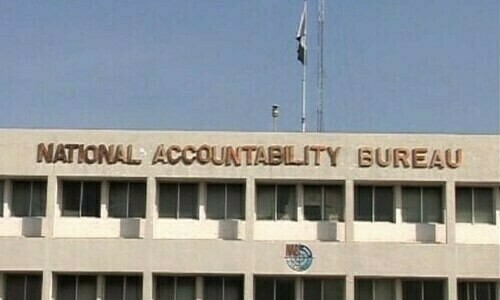ISLAMABAD: Presented with a final opportunity to give its views on the ongoing case against changes to the anti-graft law in the Supreme Court, the former PDM coalition government, in a rather puckish response, said that while the ongoing corruption cases will still be tried by different courts, “being a parliamentarian was not an offence in Pakistan”.
The reference was part of the reply submitted before a three-judge Supreme Court bench by senior counsel Makhdoom Ali Khan, who has been representing the — now former — federal government.
To legal observers, the reply’s sardonic undertones were “a subtle commentary” on the discussions that took place in the court as it heard PTI chief Imran Khan’s plea against the amendments to the National Accountability Ordinance (NAO).
The case is in its final stages as earlier this week, the three-judge bench comprising Chief Justice of Pakistan (CJP) Umar Ata Bandial, Justice Ijazul Ahsan and Justice Syed Mansoor Ali Shah had reserved its ruling.
The proceedings which started on July 19, 2022, were punctuated with judges’ observations that the lawmakers or parliamentarians, being people’s representatives and trustees, should be transparent and fair in their affairs.
However, through the 27 amendments to the law made by the PDM government, people have been deprived of the opportunity to question their chosen representatives in case of a breach of their duty towards the people.
During the hearings, questions were also asked if the amendments would have the effect of legitimising certain forms of corruption and creating select cases of accountability to exclude from prosecution under NAO.
The fresh reply was submitted after CJP Bandial, through a court associate asked: “If the Accountability Court were to send/transfer a reference against a parliamentarian for lack of its jurisdiction, then which would be the competent transferee court to adjudicate the reference and under which law?”
According to the response, if the parliamentarian was accused of misusing authority and the case didn’t fall within the ambit of the NAO, 1999 or if the offence was under Rs500 million, the NAB chairman could refer it to the relevant agency, authority or department like the provincial anti-corruption agencies for probe under Sections 5 and 5-A of the Prevention of Corruption Act (PCA), 1947 or the police for investigation of offences under Sections 161, 165, 405, 409, 420, 468 and 477A of the Pakistan Penal Code (PPC), 1860.
Elaborating further, the reply said that if the matter was under trial and the court was of the opinion that the offence couldn’t be prosecuted under the NAO, it may transfer the case to any other appropriate court, tribunal, forum, agency or authority.
These include the relevant courts for an offence allegedly committed under the provisions of PCA, 1947, read with Pakistan Criminal Laws (Amendment) Act, 1958, or the relevant court for offences under PPC.
If the parliamentarian is facing a case of assets disproportionate to known sources of income or if the offence is under Rs500m, then if the matter is not under trial, the NAB chairman may refer the probe to provincial anti-corruption agencies under Sections 5-B and 5-C of PCA, or to the Federal Board of Revenue (FBR), if the assets so held or acquired have not been declared in the income tax returns or wealth statement.
The FBR may impose a tax liability by revising the return or wealth statement.
Likewise, the case could be transferred to the Election Commission of Pakistan (ECP) if the alleged assets are not declared in the asset and wealth statement filed with the commission under the Elections Act, 2017.
If an offence of a fiscal nature is alleged against the parliamentarian, and the case is not under trial, the NAB chairman may send it for investigation to the FBR (in case of tax evasion) or the provincial revenue authorities.
Moreover, cases could also be transferred to Special Courts for the trial of offences under ITO, Sales Tax Act, 1990, Federal Excise Act, 2005, Customs Act, 1969 and other respective statutes.
Published in Dawn, September 10th, 2023















































Dear visitor, the comments section is undergoing an overhaul and will return soon.